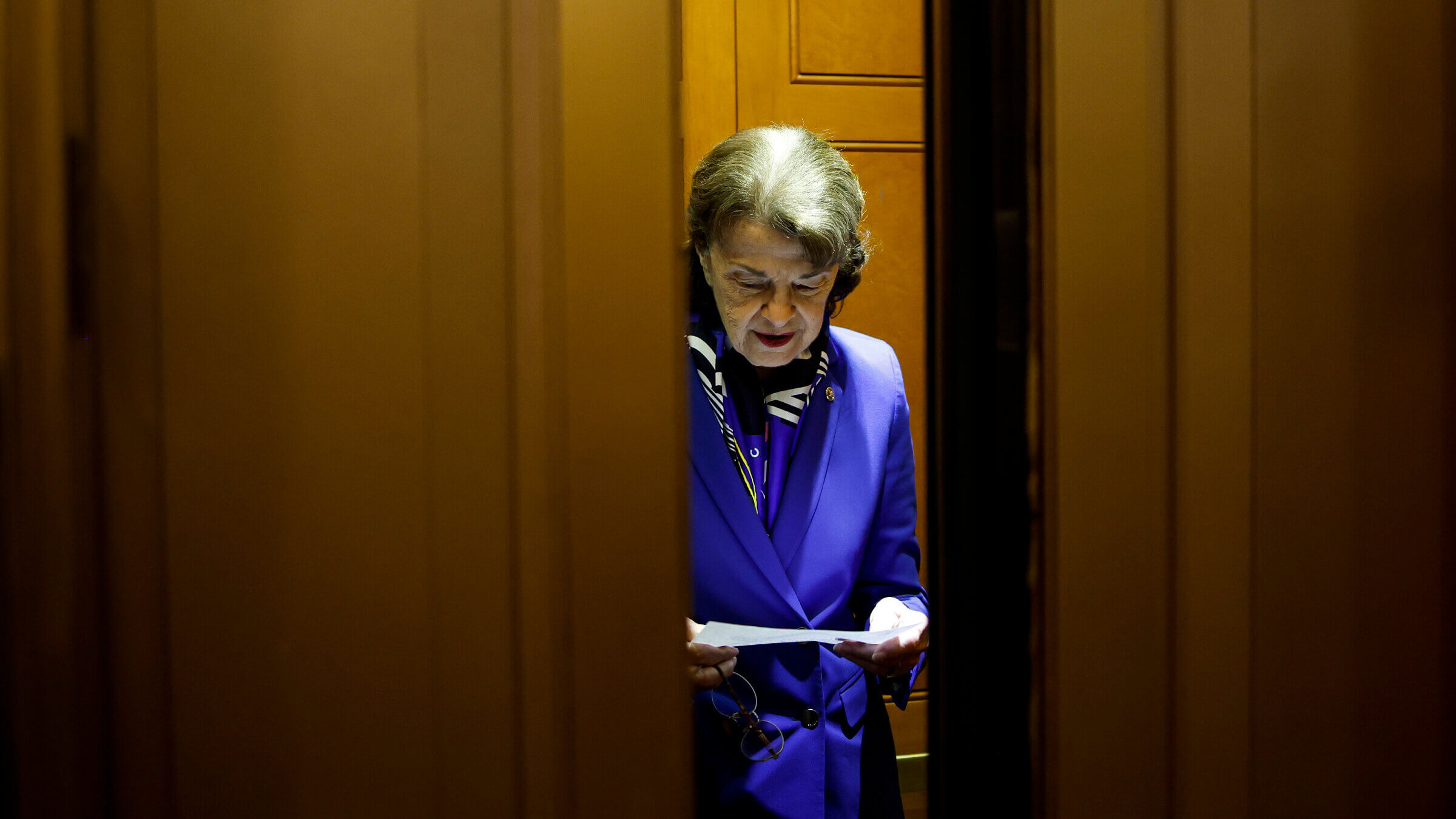Of course Dianne Feinstein doesn’t want to go. Neither did Moses.
Jewish tradition has something to say about towering figures who don’t want to leave the tower

Sen. Dianne Feinstein departs from the Senate Chambers on Dec. 5, 2022.
It feels like piling on to say what almost everyone, including people closest to Sen. Diane Feinstein, have been saying for a while: she needs to resign.
This has nothing to do with her age, but her incapacity. There are ample reports that she can no longer perform the duties of her office. She struggles to “recall the names of colleagues, frequently has little recollection of meetings or telephone conversations, and at times walks around in a state of befuddlement,” reported The New York Times — last year.
Listen to That Jewish News Show, a smart and thoughtful look at the week in Jewish news from the journalists at the Forward, now available on Apple and Spotify:
This year, her prolonged absence from the Senate floor for health reasons has stymied votes on President Joe Biden’s nominees to the federal judiciary. Given the Supreme Court’s conservative majority, confirming those judges is a crucial part of a liberal agenda, which Feinstein has long and effectively advanced in her five-decade political career, first as San Francisco mayor, then as senator.
That career includes a pioneering legacy as a Jewish legislator. Feinstein was born Dianne Goldman in San Francisco in 1933, the granddaughter of a Polish immigrant, Sam Goldman, who founded three synagogues in the Bay Area. In 1977, as the city’s first woman mayor (and its second Jewish one), Feinstein established a Holocaust memorial in the city and rejected a sister city relationship with Leningrad, citing the Soviet Union’s treatment of Jews.
Elected to the Senate in 1990, she sponsored legislation to prevent advanced weapons sales to Israel’s enemies, and she also, as part of her instrumental effort to enact an assault weapons ban, publicly criticized Prime Minister Benjamin Netanyahu for allowing the export of modified Uzis to the U.S.
As a woman, a Jew and a politician, Feinstein has scaled the mountaintop, and it’s understandable why she doesn’t want to step down. Moses didn’t either.
Jewish law and tradition make it abundantly clear that the elderly are due respect and deference. The idea that the matriarch Sarah was 90 and Abraham was 100 when they conceived Isaac is, well, exhausting, but is also a lesson in not counting old people out.
But Judaism also recognizes the inevitability of aging, and our responsibility to face it. There’s a powerful rabbinic commentary on the death of Moses, who, told he must die, takes his case for staying alive and in his current job directly to God.
“Master of the world, is it for nothing that my feet have trodden Araphel?” Moses says, referring to the deep clouds at the top of Mount Sinai. “Is it for nothing that I have run before Your children like a horse, that my end be for the worm?”
God points out that Adam, Abraham and Isaac, all good people, got old and died as well, but Moses argues back. He asks the stars, the angels, the sea that he split, all to defend him, but they turn their backs.
“I was a world king,” Moses moans, “but now I am prostrate, and they pay no attention to me.”
Nothing convinces Moses it’s time, until God’s final argument: that Moses must make room for Joshua to lead.
“Now your lot is over and the time of your disciple Joshua to serve has arrived,” God says.
That works. “My Master, if I am dying because of Joshua, let me go and become his disciple!”
It was time, Moses understood, to step down so the next generation could step up.
Everyone ages differently. My grandmother Bertha Vogel volunteered at a local senior home to help what she called “the old people” celebrate their birthdays. They were mostly in their 70s, she was 92. My father, who retired at 91, is now 96, and can tell you the closing price of any stock worth buying. He’d be a perfectly fine junior senator from California, but he’s happy to rest on his ample laurels, and to know that his successors stepped up superbly to take his place.
Not everyone has a Joshua in the wings, but California has at least three potential new senators who’ve declared for her seat — Reps. Barbara Lee, Adam Schiff and Katie Porter — all of whom would continue to expand her legacy.
Yes, Feinstein, like Moses, can find a thousand reasons to cling to office. But aside from making space for her successors, there is another good reason to step down.
In his new book about retirement, Independence Day, the Los Angeles Times columnist Steve Lopez writes that the greatest challenge retirees face is a loss of purpose and meaning, a reason to get out of bed in the morning.
But that doesn’t mean you can expect to go on doing the job you love and were once great at forever.
Writing about Feinstein recently, Lopez perfectly summarized God’s message to Moses, and to us all: “There is dignity in moving on.”

















